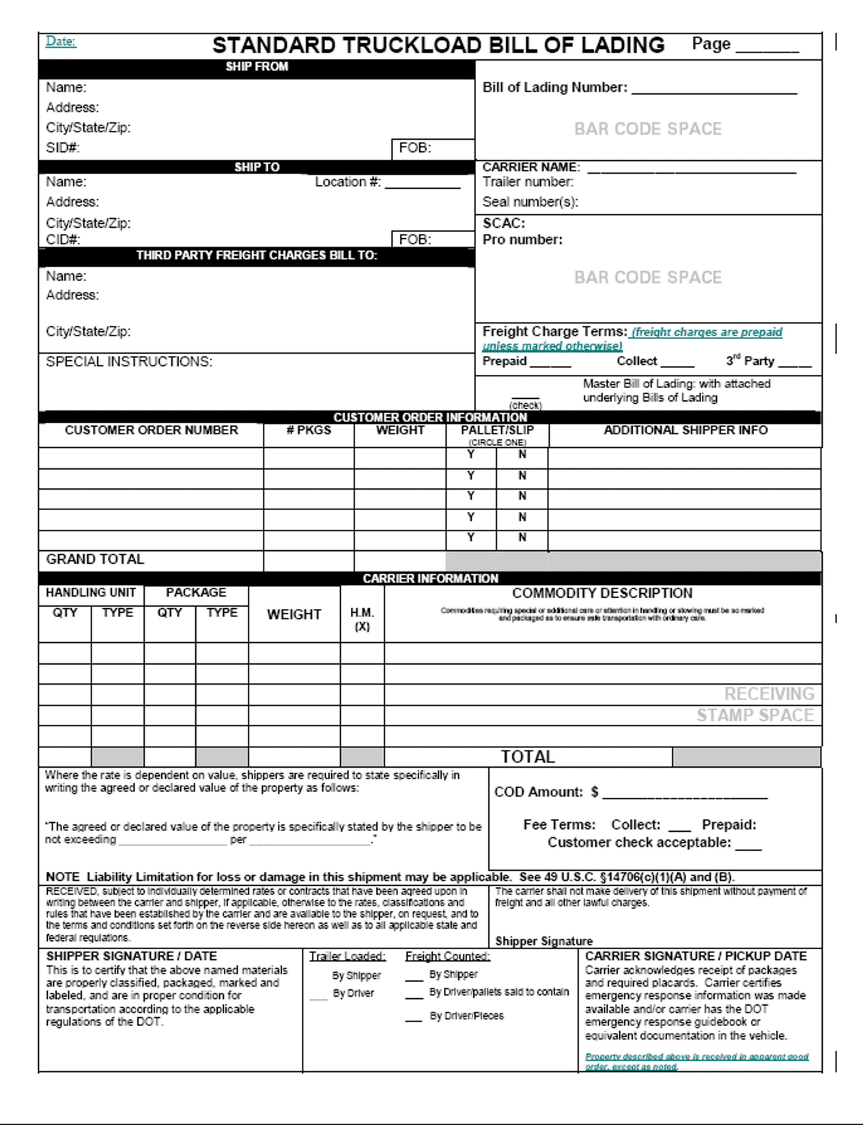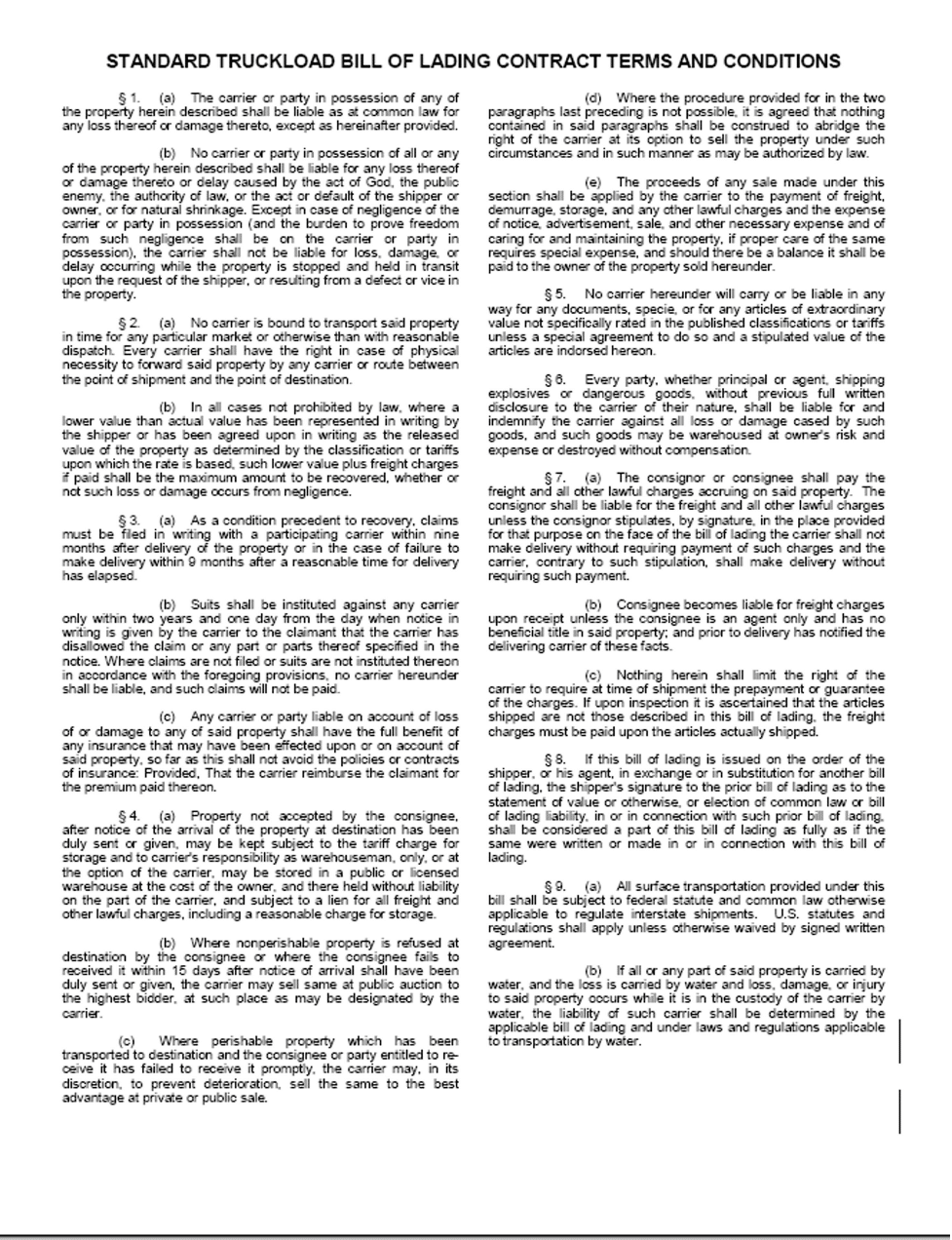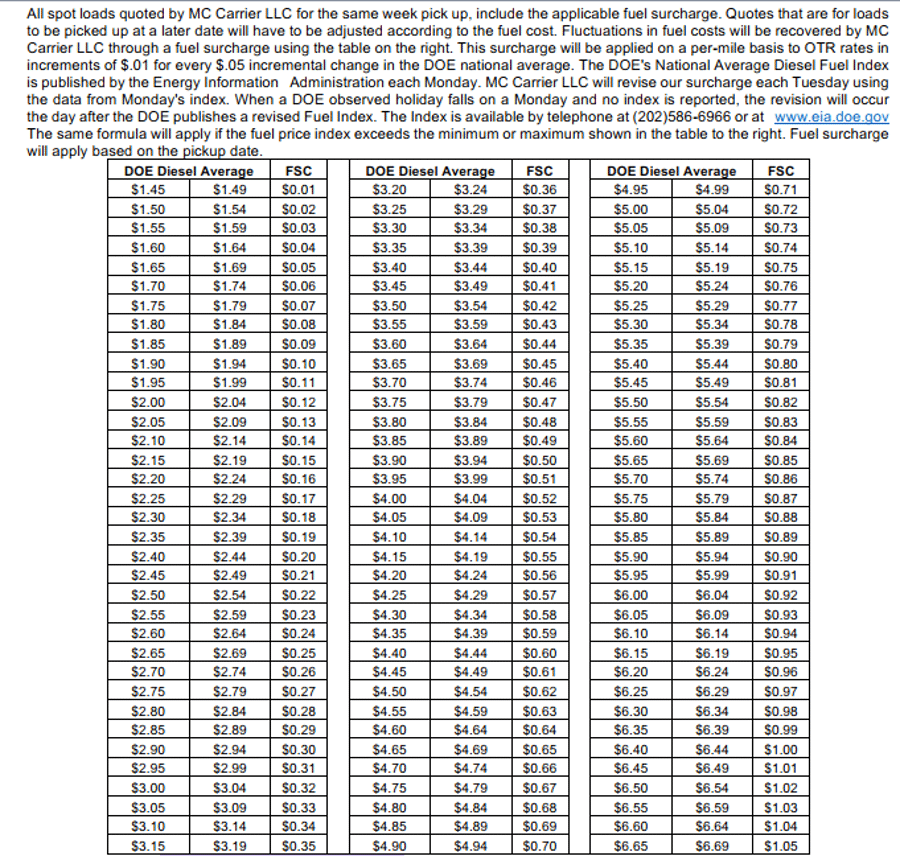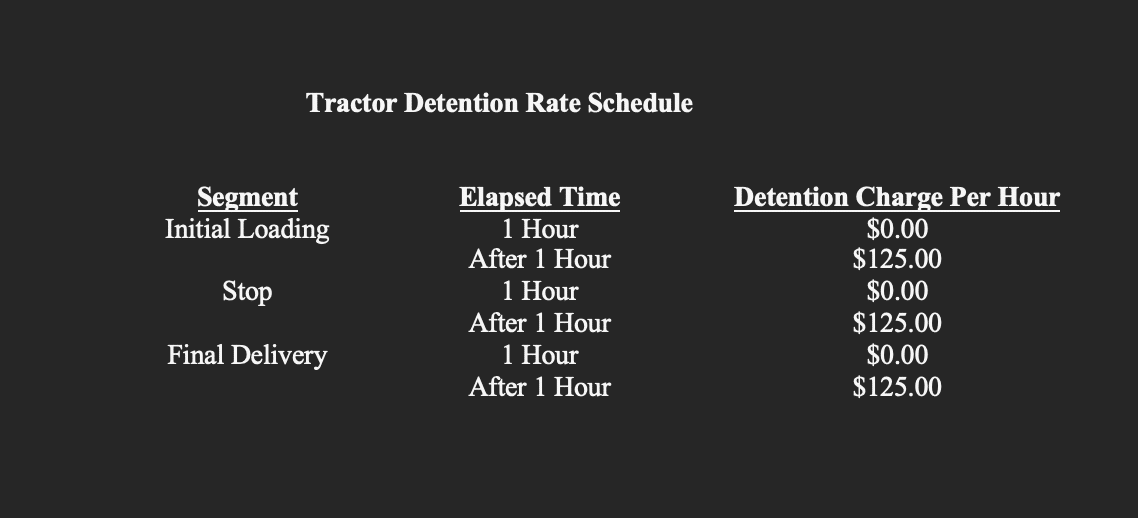MC CARRIER LLC MC 825444
TARIFF GOVERNING RULES, REGULATIONS AND SCOPE OF OPERATIONS
APPLICABLE ON SHIPMENTS BETWEEN POINTS IN THE UNITED STATES, CANADA, and MEXICO and INTERMODAL SHIPMENTS
This Tariff Applies on International, Interstate, and Intrastate Traffic.
EFFECTIVE: January 1st, 2022
Issued by: MC Carrier LLC
3033 Losee Rd. North Las Vegas, NV 89030
Table of Contents
ITEM 102 – BILLS OF LADING.. 1
ITEM 105 – BILLS OF LADING, CONTRACTS AND AUTHORITY OF COMPANY PERSONNEL 4
ITEM 110 – BROKERAGE AUTHORITY.. 4
ITEM 115 – SUBSEQUENT VERSIONS OF THIS TARIFF. 4
ITEM 120 – INTERPRETATION OF THIS TARIFF. 4
ITEM 125 – GOVERNING PUBLICATIONS. 4
ITEM 130 – INTERSTATE vs. INTRASTATE.. 5
ITEM 140 – NON APPLICATION OF TARIFF. 5
ITEM 145 – NOTICE AND AMENDMENTS. 5
ITEM 150 – OPERATING AUTHORITY.. 5
ITEM 155 – PARTICIPATING CARRIERS. 5
ITEM 160 – RATES AND SCHEDULES. 6
ITEM 165 – REGULATED vs. EXEMPT. 6
ITEM 175 – CONSENT TO JURISDICTION.. 6
ITEM 200 – APPLICATION OF TARIFF. 7
ITEM 205 – APPOINTMENTS/PICKUP & DELIVERY TIMES. 7
ITEM 210 – COMMODITY LIMITATIONS. 7
ITEM 215 – CONVENIENCE INTERLINING.. 7
ITEM 220 – DROPPED TRAILERS. 8
ITEM 225 – PERMITTED BROKERING.. 8
ITEM 230 – HAZ-MAT SHIPMENTS. 8
ITEM 235 – IMPRACTICAL OPERATIONS. 8
ITEM 245 – IMPORT & EXPORT FREIGHT – CANADA/MEXICO.. 9
ITEM 250 – ON-HAND SHIPMENTS. 9
ITEM 260 – INTERMODAL SHIPMENTS. 9
ITEM 262 – PACKING OR PACKAGING, BLOCKING, RACKS, STANDARDS OR SUPPORTS 9
ITEM 265 – PICKUP & DELIVERY SERVICE. 10
ITEM 270 – RIGHT TO OPEN/INSPECT. 10
ITEM 273 – SERVICE STANDARDS. 10
ITEM 275 – SHIPPER LOAD & COUNT. 10
ITEM 280 – SUBSTITUTED SERVICE. 10
ITEM 285 – TERRITORIAL SCOPE. 10
ITEM 290 – FOOD SAFETY PROTOCOL.. 11
SECTION 3 – RATES AND ASSESSORIAL CHARGES. 12
ITEM 300 – ADDITIONAL CHARGES – SAME DAY DELIVERY.. 12
ITEM 302 – APPLICATION OF CERTAIN RATES. 12
ITEM 305 – CUSTOMER REQUESTED DEADHEAD.. 12
ITEM 315 – AFTER HOURS PICKUPS AND DELIVERIES BY SPECIAL REQUEST. 14
ITEM 317 – ALTERATION—RATES AND WEIGHTS. 14
ITEM 320 – APPLICATION OF ACCESSORIAL CHARGES. 14
ITEM 325 – COLLECT ON DELIVERY (COD) SHIPMENTS. 14
ITEM 327 – CONTROL OR EXCLUSIVE USE OF VEHICLE.. 15
ITEM 330 – DETENTION – VEHICLE WITH POWER UNITS. 15
ITEM 335 – DETENTION – VEHICLE WITHOUT POWER UNITS. 15
ITEM 337 – ESCORT VEHICLE WITH DRIVER.. 16
ITEM 340 – LAYOVER PROVISION.. 16
ITEM 345 – LIABILITY FOR ACCESSORIAL CHARGES. 16
ITEM 350 – LOADING AND UNLOADING.. 16
ITEM 355 – LOADING AND UNLOADING UPON ARRIVAL.. 16
ITEM 357 – UNLOADING—DRUMMING CHARGE FOR LIQUID.. 16
ITEM 360 – OVERLOAD – OVERWEIGHT. 17
ITEM 367- PARTICULAR ROUTES. 17
ITEM 380 – ROUND TRIP RATES. 18
ITEM 384 – STOPOFF FOR PARTIAL LOADING AND/OR UNLOADING.. 18
ITEM 395 – EQUIPMENT FURNISHED BUT NOT USED.. 19
ITEM 396 – TEAM DRIVER CHARGES. 19
SECTION 4 – FREIGHT CLAIMS. 20
ITEM 400 – EXCESS LIABILITY RATES AVAILABLE. 20
ITEM 405 – CLAIMS LIABILITY.. 20
ITEM 415 – CLAIMS LOSS & DAMAGE – ACCEPTANCE OF GOODS. 22
ITEM 420 – CLAIMS LOSS & DAMAGE – CLEAR DELIVERY.. 22
ITEM 425 – CLAIMS LOSS & DAMAGE – SALVAGE. 22
ITEM 430 – DISPOSITION OF OVERAGE. 22
ITEM 435 – INADVERTANCE CLAUSE. 23
ITEM 440 – RELEASED VALUE DECLARATION AND LIMITATION OF LIABILITY.. 23
ITEM 445 – RELEASED VALUATION/USED GOODS. 23
ITEM 450 – RELEASED VALUATION/MEXICO AND CANADA.. 23
ITEM 455 – SEALED TRAILERS. 23
ITEM 465 – SPECIAL, CONSEQUENTIAL AND PUNITIVE DAMAGES. 24
ITEM 470 – SPOTTED EQUIPMENT. 24
SECTION 5 – FREIGHT CHARGES. 25
ITEM 500 – CREDIT AND COLLECTIONS. 25
ITEM 510 – COLLECTION AND PAYMENT OF CHARGES. 25
ITEM 540 – JURISDICTION AND VENUE OF COLLECTION SUIT.. 25
ITEM 550 – LIEN FOR FREIGHT CHARGES. 26
ITEM 560 – PAYMENT WITHOUT OFFSET.. 26
ITEM 570 – PRIORITY OF FREIGHT CHARGE OBLIGATION.. 26
ITEM 580 – THIRD PARTY BILLING.. 26
ITEM 590 – UNDERCHARGE/OVERCHARGE CLAIMS. 27
SECTION 6 – DOMESTIC INTERMODAL SHIPMENTS. 28
ITEM 610 – ARRIVAL NOTICE.. 28
ITEM 615 – CLAIMS FOR OCEAN FREIGHT. 28
ITEM 620 – CUSTOMS – OCEAN FREIGHT. 28
ITEM 640 – LOADING AND UNLOADING CONTAINER.. 29
ITEM 660 – PER DIEM/ DETENTION/ DEMURRAGE.. 29
ITEM 670 – TERMINAL CHARGES AT PORT/RAILHEAD.. 29
ITEM 680 – UNDELIVERED FREIGHT. 29
ITEM 685 – USE OF EQUIPMENT.. 30
ITEM 690 – ACCESSORIALS FOR DOMESTIC INTERMODAL SHIPMENTS. 30
ITEM 695 TRACTOR DETENTION (DETENTION WITH POWER) 30
ITEM 710 – TARPING (REQUESTED) 32
ITEM 720 – TARPING (PLACEMENT OF) 32
ITEM 740 – ACCESSORIALS FOR FLATBED SHIPMENTS. 32
ITEM 750 DETENTION WITH POWER (Tractor Detention) 33
SECTION 8 – OVERSIZE & OVERWEIGHT SHIPMENTS. 34
ITEM 810 – CHARGES FOR OVERDIMENSION FREIGHT. 34
ITEM 880 – SPECIAL PERMITS. 34
ITEM 890 – SPECIAL RATES OR ACCESSORIAL CHARGES. 35
SECTION 9 – TEMPERATURE CONTROLLED SHIPMENTS. 36
ITEM 905 – REFRIGERATED SERVICE. 36
ITEM 920 – PROTECT FROM FREEZING SERVICE. 36
SECTION 1 – GENERAL TERMS
ITEM 100 – DEFINITIONS
- Except as provided in ITEM 900, the term “shipment” means a lot of freight tendered by a shipper to a carrier at one place at one time for delivery to one consignee at one destination on one bill of lading.
- The term “point” means a particular city, town, village, community or other area which is treated as a unit for the application of line-haul rates.
- The term “place” (see NOTE A) means a particular street, address or other designation of the factory, store, warehouse, place of business or private residence at a “point.”
- The term “site” means a particular platform or specific location for loading or unloading at a “place.”
- The term “truck” means any vehicle or vehicles propelled or drawn by a single mechanical power unit and used on the highways in the transportation of property.
- The term “business day” means each day, Monday thru Friday, excluding holidays.
- The term “holiday” means any day designated as a full holiday (not ½ day) nationally, by Federal or State Statute or by local proclamation. When the holiday falls on Sunday, the following Monday will be considered a “holiday.”
- The term “carrier”, “consignor” or “consignee” include the authorized representatives or agents of such “carrier”, “consignor” or “consignee.”
- The term “Consignor to load the shipment” means the consignor will perform the complete service of loading the freight in or on the carrier’s truck and the proper stowing and/or stacking thereof to withstand the normal hazards of transportation. When blocking or bracing is necessary to ensure safe transportation, such blocking or bracing must be furnished by and at the expense for the consignor.
- The term “Consignee to unload the shipment” means that the consignee will perform the complete service of unloading the freight from the position in which it was transported in or on the carriers’ truck.
- The term “ton-mile” means a measurement of the freight transportation performed by the carrier on a given shipment, the total of which consists of the sum of the products obtained by multiplying the aggregate weight of the shipment in tons by the number of miles for which it is transported. As a measure of weight, a ton is 2,000 lbs.
ITEM 102 – BILLS OF LADING
The terms and conditions of the MC Carrier LLC Bill of Lading shall apply notwithstanding the use by Shipper of any other bill of lading or shipping document. Drivers are not authorized to bind Carrier to non-conforming bills of lading and execute bills of lading with alternative terms and conditions as receipts for the shipment only.

ITEM 105 – BILLS OF LADING, CONTRACTS AND AUTHORITY OF COMPANY PERSONNEL
ONLY Carrier officials or personnel authorized to do so by the Carrier are empowered to enter into agreements or alter existing agreements. Authorized officials are Carrier personnel with the title of vice president or higher. Terminal managers are not authorized personnel. Drivers employed or hired by Carrier are among those excluded from the category of authorized carrier personnel. Where a Bill of Lading issued by the shipper is signed for by the Carrier’s driver or other unauthorized person(s), that signature acknowledges only receipt of the freight and identifies the entity to which to deliver. It is NOT a contract for the carriage of freight. Continued use of an unauthorized Bill of Lading by the shipper will NOT constitute an implied acceptance by Carrier. Carrier drivers are not authorized to accept freight for which Section 7 is executed or to bind the company for other types of nonrecourse language.ITEM 110 – BROKERAGE AUTHORITY
Carrier reserves the right to provide transportation service through its affiliated brokerage VEGAS FREIGHT COMPANY rather than acting as motor carrier. In the event Carrier chooses to handle the shipment through its affiliated broker, Carrier’s liability and obligations shall be as a broker and not a carrier. In the event that the broker is listed on the bill of lading as the carrier, this is for convenience only and is not intended to indicate that the broker is the carrier.ITEM 115 – SUBSEQUENT VERSIONS OF THIS TARIFF
When this tariff is amended, all shipments accepted by Carrier after the amendment are subject to the revision. The current tariff is available by request or at the Carrier’s website at https://mccarrierllc.com/ .ITEM 120 – INTERPRETATION OF THIS TARIFF
No provision of this Tariff may be altered or amended orally, and any deviation from this Tariff must be in writing and agreed to by an Authorized Official of Carrier (see Item 105). This Tariff is subject to change without notice. The version of the Tariff in effect at the time of the acceptance of the shipment shall apply to the shipment.ITEM 125 – GOVERNING PUBLICATIONS
This tariff is governed, except as otherwise provided herein, by the following described publications, and by supplements thereto or successive reissues thereof. (Note A). Kind of Tariff Issuing Agent Series Rules MC CARRIER LLC Carrier Tariff Note A – When an item is published in this tariff covering the same service as an item published in a tariff mentioned in this item, such item published herein, to the extent of its application, will apply in lieu of the items published in tariff’s mentioned in this item.ITEM 130 – INTERSTATE vs. INTRASTATE
The rules set forth in this Circular shall apply to all shipments handled by Carrier regardless of the origin or destination.ITEM 135 – MILEAGE GUIDE
Where rates are set forth in cents per mile or other calculation based on mileage, distances shall be determined from origin to destination via intermediate points as specified by the Shipper utilizing the most recent edition of the following mileage guide: PC Miler Practical (Latest Revision) Mileage on shipments stopped in transit for partial loading and/or partial unloading will be determined by calculating the mileage from origin to final destination via the point or points at which vehicle is stopped for partial loading or unloading.ITEM 140 – NON APPLICATION OF TARIFF
Where Carrier has published a specific tariff for a shipper, the terms of that pricing/tariff shall apply in lieu of this tariff.ITEM 145 – NOTICE AND AMENDMENTS
Upon written request, Carrier will provide its customers and shippers with copies of all applicable rules and rates. Rules and accessorial charges are available on Carrier’s web site at: Rules and accessorial charges are available on Carrier’s web site at:ITEM 150 – OPERATING AUTHORITY
Carrier has 48 state irregular route authorities within the United States. Copies of the operating certificate are available upon request.ITEM 155 – PARTICIPATING CARRIERS
Motor carriers party to this tariff are shown below:Carrier/Broker Name and MC Number
MC CARRIER LLC – MC 825444, SCAC: MCIBITEM 160 – RATES AND SCHEDULES
The rules published herein are applicable to all shipments transported by Carrier unless expressly waived in a signed bilateral contract pursuant to 49 U.S.C. § 14101(b). Rates and schedules may be published in rate catalogues, on a shipper specific basis or pursuant to a spot market rate quotation.ITEM 165 – REGULATED vs. EXEMPT
The rules set forth in this Circular shall apply to shipments exempt from economic regulation as well as shipments subject to the jurisdiction of the FMCSA. Liability for loss, damage and delay shall be governed by 49 U.S.C. § 14706 (the Carmack Amendment), or, where applicable, the Carriage of Goods by Seas Act (COGSA).ITEM 170 – WAIVER
Carrier’s failure to enforce the terms of this Tariff shall not be a waiver of the Carrier’s rights to do so in the future.ITEM 175 – CONSENT TO JURISDICTION
Unless the Carrier and purchaser of carrier’s services have previously agreed in writing to proceed otherwise, the Carrier and the purchaser of carrier’s services consent to the exclusive personal jurisdiction of the State and Federal Courts applicable to North Las Vegas, Nevada, for filing all civil actions arising out of the transportation services performed, or to be performed by Carrier. To the extent not inconsistent with federal statutes, regulations, or common law, this Circular, all other contractual agreements between Carrier and the purchaser of carrier’s services, and all rights, duties, and obligations between Carrier and the purchaser of carrier’s services shall be governed by the law of the State of Nevada, without regard to its choice of law provisions.SECTION 2 – OPERATIONS
ITEM 200 – APPLICATION OF TARIFF
Each provision of this rule tariff shall apply to each transportation agreement entered into by Carrier unless expressly waived in a signed, written agreement.ITEM 205 – APPOINTMENTS/PICKUP & DELIVERY TIMES
Pick-ups and deliveries shall be during customer’s normal business hours. Appointments shall be made at no charge. Carrier shall not be liable for late deliveries or un-kept appointments. Consignee shall facilitate prompt unloading in the event of missed appointments.ITEM 210 – COMMODITY LIMITATIONS
Carrier does not provide service related to transportation of jewelry, objects of art, currency, documents, and items of unusual value or rare metals.ITEM 215 – CONVENIENCE INTERLINING
In order to provide the most efficient, economical service to the shipping public, Carrier may utilize the service of other carriers to achieve the transportation service required for tendered shipment, EXCEPT if bills of lading covering tendered shipments are noted by shippers that “convenience interlining not applicable”, convenience interlining will not be utilized. Interchange of freight of service will be at points common to the authorized service of Carrier. Shipments accorded “convenience interlining” shall move on the bill of lading of Carrier, who shall assume responsibility for the lading, and such shipments shall be charged for service performed exclusively by Carrier.ITEM 220 – DROPPED TRAILERS
Carrier will drop trailers only when specific arrangements have been made in writing, in advance of shipment between Carrier and Carrier’s customer. Carrier’s customer assumes responsibility for loss of damage to such trailers until such time as Carrier accepts the freight tendered on the dropped trailer. Carrier has no liability for loss or damage to freight on a dropped trailer until such time as Carrier’s driver accepts such freight.ITEM 225 – PERMITTED BROKERING
Carrier may use the broker services of Vegas Freight Company, under broker authority MC- 945170. For all shipments that Carrier elects to use Vegas Freight Company, it will maintain proper DOT authority and surety bond. Vegas Freight Company will ensure all its brokered loads are to carriers with current DOT motor carrier authority, have satisfactory safety records, maintain all licenses and permits required by applicable federal, state, and local governmental authorities, and provide proof of required insurance coverages, including DOT public liability and sufficient cargo insurance. Additionally, all such carriers will satisfy driver and equipment DOT requirements, assume all obligations for transportation services, and agree to all terms and conditions mandated by the shipper for the transportation of its freight. Vegas Freight Company will require carriers to indemnify for all damages, including, but not limited to, cargo and physical damage and bodily injury.ITEM 230 – HAZ-MAT SHIPMENTS
Over-the-road shipments of hazardous materials, wastes or substances will be subject to the following requirements: (1) Shipper must provide Carrier at least 48 hours prior notice before providing any load information (i.e. Shipper, origin, consignee, and destination).- Shipments which are delayed at any time due to restrictions by Shipper, its agent, consignee, or any government body will be subject to a delay charge of $750.00 per 24 hour period or fraction thereof. Charges will begin to accrue when the load is delayed and will cease when the load is cleared for transport.
- Each hazardous materials load must be properly noted on the bill of lading. There will be a charge of $250.00 per shipment.
ITEM 235 – IMPRACTICAL OPERATIONS
Nothing in this rule tariff shall require the Carrier to perform pick-up or delivery service at any location from or to which it is impracticable, through no fault or neglect of the Carrier to operate vehicles because of:- The condition of roads, streets, driveways, or alleys;
- Inadequate loading or unloading facilities;
- Riots, Acts of God, the public enemy, closure of public highways, the authority of law, strikes or labor unrest the existence of violence, or such possible disturbances as to create reasonable apprehension of danger to person or property; or
ITEM 240 – INDEMNITY
Carrier and shipper will each indemnify, defend and hold the other harmless from and against any liability, losses, damages, claims, judgments, fines, penalties, lawsuits and expenses (“Costs”) resulting from personal injury, property damage (other than cargo), or violation of the law caused by their respective negligent or wanton acts or omissions.ITEM 245 – IMPORT & EXPORT FREIGHT – CANADA/MEXICO
Limitation of Carrier’s Liability for Proper Customs Clearance. Carrier assumes no responsibility for insuring or otherwise providing for clearance of merchandise through or inspection by Canadian or Mexican Customs. Carrier does not represent and specifically disclaims any knowledge or expertise in proper customs clearance and inspection matters. Carrier is not responsible for the acts or omission of any Customs Agent or Freight Forwarder that may be selected for the purpose of clearing shipper’s merchandise through Customs. Carrier will serve merely as a liaison between shipper and the Customs Agent (and the Customs Agent’s Freight Forwarder) at shipper’s request and only as a convenience to shipper. Carrier or party in possession shall not be liable for loss, damage, deterioration of the freight or delay in delivery due to the duration of the period required by customs clearance or inspection.ITEM 250 – ON-HAND SHIPMENTS
From time to time and for various reasons, freight may be deemed to be “on-hand.” Freight will be deemed on-hand with or without notice. When freight is “on-hand” the legal liability of Carrier is altered from that of a motor carrier to that of a warehouseman pursuant to the Uniform Commercial Code. The procedures which Carrier agrees to and will take as a warehouseman involve the use of ordinary care to keep the lading in a safe or suitable place or to store the lading properly. Carrier shall (a) place the lading in public storage, if available, unless Carrier receives contrary disposition instructions from Shipper within twenty-four (24) hours, and (b) if disposition instructions are not given by Shipper within ten (10) days of Carrier’s initial notification to Shipper, Carrier may offer the lading for public sale. Shipper will be responsible for storage costs and reasonable costs Carrier incurs in acting as a warehouseman. To the extent any sale or disposal revenues exceed the storage costs and the costs Carrier incurs as a warehouseman, Carrier shall remit the balance to Shipper. If Shipper gives Carrier timely disposition instructions, Carrier shall use any commercially reasonable steps to abide with such instructions. Shipper will pay Carrier’s costs and any additional transportation costs Carrier incurs in doing so.ITEM 260 – INTERMODAL SHIPMENTS
Carrier participates in the Uniform Intermodal Interchange Agreement (UIIA). See Section 6 for rules applicable to Intermodal Shipments.ITEM 262 – PACKING OR PACKAGING, BLOCKING, RACKS, STANDARDS OR SUPPORTS
Any temporary blocking, flooring or lining, racks, pallets, standards, stakes or similar bracing, dunnage or support or other commonly used items not constituting a part of the truck when required to protect and make freight secure for shipment, will be furnished and installed at the expense of the shipper unless Carrier has agreed to supply said equipment free of charge. The weight of this equipment shall be considered part of the shipment.ITEM 265 – PICKUP & DELIVERY SERVICE
The rates names herein include pickup or delivery at all points within the limits of the cities, towns, villages and other points from and to which rates apply, but each shipment will include only one pickup and one delivery.ITEM 270 – RIGHT TO OPEN/INSPECT
Carrier reserves the right to open/inspect any freight which has been accepted for shipment, including loads that have been sealed.ITEM 273 – SERVICE STANDARDS
Carrier does not offer guaranteed service on any shipments. On all shipments, freight shall be delivered upon reasonable dispatch. Appointment times and notations such as “must deliver by” on the bill of lading are insufficient to alter the reasonable dispatch standard.ITEM 275 – SHIPPER LOAD & COUNT
All shipments shall be loaded by the consignor and unloaded by the consignee. Carrier’s drivers are instructed to sign bills of lading as shipper load and count or “SLC”. Inadvertent omission of this notation shall not result in a presumption of carrier liability for shortage or damage (in the absence of upset or accident) where the driver was either not present or not allowed to observe the loading and unloading.ITEM 280 – SUBSTITUTED SERVICE
For its operating convenience, Carrier reserves a right to hire other carriers as qualified subcontractors to provide all or part of given movements. Carrier agrees to protect the rates set forth herein when substituted services are provided and warrants that all terms, conditions, duties and obligations owed to shipper by this tariff, bill of lading, and/or contract will be provided.ITEM 285 – TERRITORIAL SCOPE
Carrier is authorized by the Federal Motor Carrier Safety Administration (FMCSA) in Docket No. MC 825444: “To operate as a motor common carrier of property.”ITEM 290 – FOOD SAFETY PROTOCOL
For shipments subject to the Food Safety Modernization Act (“Act”) and associated regulations, Shipper or Broker must inform Carrier, in writing, of applicable transportation protocols. An authorized official of Carrier (See Item 105) must agree to the protocols. Protocols provided in a bill of lading or other shipping document are not sufficient to trigger’s Carrier’s obligations under the Act. If Shipper or Broker fails to comply with these requirements, Carrier will be unable to comply with its responsibilities under the Act and shall not be liable for loss or damage to shipments resulting therefrom. Shipper or Broker will defend, indemnify, and hold Carrier harmless for claims arising from Shipper’s or Broker’s failure to comply with the requirements of this item.ITEM 293 – EQUIPMENT
(1) No Shipper or receiver will have the right to the exclusive use of equipment. Note: Carrier will determine the utility of its equipment in relation to the customer’s need. (2) Carrier’s equipment is controlled and operated by Carrier’s employees and owner operators only. Any other use or operation, without specific written authorization is expressly prohibited. ___________________________________________________________________________________________SECTION 3 – RATES AND ASSESSORIAL CHARGES
ITEM 300 – ADDITIONAL CHARGES – SAME DAY DELIVERY
On shipments requiring delivery the same calendar day as that of pick up charges will be 125% of the normal linehaul rate.ITEM 302 – APPLICATION OF CERTAIN RATES
- Rates, rules and commodity columns published in this guide apply for the account of Carrier to the extent authorized.
- Except as otherwise provided, volume or truckload rates apply only when a volume or truckload of freight is shipped from one point (or places within plant of one shipper) in one day by one shipper, on one bill of lading, for delivery to one consignee at one destination. When a volume or truckload rate is used, charges will be assessed at the volume or truckload minimum weight or actual weight, whichever is greater.
- Except as otherwise provided, when a number of different articles for which rates are provided when in straight volume or truckload shipments, are shipped at one time by one consignor to one consignee at one destination on one bill of lading, each commodity will be charged for at its actual gross weight at the straight volume or truckload rate applicable to that article. The volume or truckload minimum weight will be the highest provided for any article in the mixed shipment and any deficit in minimum weight will be charged for at the highest volume or truckload rate applicable to any article in the mixed shipment.
- If a lower charge results from the application of a specific volume or truckload mixture, then under the provisions of Paragraph 3, such lower charge will apply.
- Subject to the provisions of Paragraphs 3 and 4, when the aggregate charge upon the entire shipment is made lower by considering the articles as if they were divided into two or more separate volume or truckload shipments, the shipment will be charged for accordingly.
ITEM 305 – CUSTOMER REQUESTED DEADHEAD
$4.00 per mile from point of dispatch to the loading location will be charged.ITEM 310 – FUEL SURCHARGE
Unless otherwise agreed to, the following fuel surcharge will apply between Carrier and shipper:
ITEM 315 – AFTER HOURS PICKUPS AND DELIVERIES BY SPECIAL REQUEST
On shipments requiring pickups and deliveries on weekends, holidays, and after hours by special request for the charges will be 125% of the normal linehaul rate. In addition, detention as otherwise provided herein shall apply between the time of arrival and loading or unloading and/or the time of subsequent dispatch.ITEM 317 – ALTERATION—RATES AND WEIGHTS
- Where different rates on the same article or articles, based on different minimum weights are provided, the lowest charge obtainable under the different rates, and minimum weight applicable thereto (or actual weight if greater) will be applied.
- In no case shall be the charge for any shipment be greater than the charge for a greater weight of the same commodity, from and to the same points via the same routes.
ITEM 320 – APPLICATION OF ACCESSORIAL CHARGES
In addition to the line haul or base rate for any shipment and unless otherwise agreed in writing, the following accessorial charges shall apply and shall be reflected on the Carrier’s invoice for service rendered.ITEM 325 – COLLECT ON DELIVERY (COD) SHIPMENTS
An authorized representative of Carrier (see Item 105) must approve any collect on delivery (COD) shipments at least 24 hours prior to the tender of the shipment. Carrier reserves the right to refuse to transport COD shipments at its sole discretion. If approved, collect on delivery (COD) shipments will be accepted subject to the following:- Carrier must be notified at least 24 hours prior to tender of the shipment that it is “COD”.
- The letters “COD” or “Collect on Delivery” must be shown in large, bold print on the shipping document immediately before the name of the consignee.
- Unless otherwise specified on the shipping document, only bank cashier’s check, certified check or money order will be accepted. Carrier will accept payment only as an agent of the shipper, and carrier’s responsibility is limited to the exercise of due diligence in forwarding payment to shipper.
- Subject to a minimum charge of $25.00 or the charge will be computed at the ratio that $25.00 bears to $1000.00.
- In the event the Shipper or Consignor fails to follow the procedures of this Item with regard to “COD” shipments, Carrier shall have no liability for the failure to collect the proper payment.
- In the event Carrier fails to collect payment, Carrier’s maximum liability shall be as if the freight were lost in transit pursuant to Section 4.
ITEM 327 – CONTROL OR EXCLUSIVE USE OF VEHICLE
SECTION 1 – CONTROL OF VEHICLE Except as provided in Section 2 of this item, no shipment is entitled to the exclusive use of the vehicle in which it is to be transported. The carrier has control of the vehicle and the restricted right to: (a) Select the vehicle or vehicles for the transportation of a shipment. (b) To load other freight in the same vehicle with any such shipment. SECTION 2 – EXCLUSIVE USE OF VEHICLE (a) When exclusive use of Carrier’s equipment is requested or demanded by the shipper or consignee to meet the needs of special conditions, charges thereon will be computed as the applicable rate and minimum weight thereto, but not less than a minimum charge based on 44,000 pounds at the applicable rate for each vehicle used. (b) When the shipper or the carrier by instructions of the shipper, affixes the shipment to or in the carrier’s vehicle by means of a numbered seal and such seal number appears on the bill of lading of shipping instructions, such shipment will be given exclusive use of the vehicle subject to the provisions of Paragraph (a) of this item. (c) Subject to availability of equipment, exclusive use of the vehicle shall be provided when the bill of lading or other written instructions bears the statement that exclusive use is required or requested, and such service will not be provided unless the bill of lading is so annotated or other written instructions are provided.ITEM 330 – DETENTION – VEHICLE WITH POWER UNITS
Vehicle with Power Units – When through no fault of the carrier, its vehicle is delayed or detained at place of loading or unloading, the following will apply:- One (1) Hours free time will be allowed to load and One (1) Hour free time will be allowed to unload each van trailer.
- Time will be computed from arrival until departure of the vehicle, including waiting time in reaching or leaving the loading or unloading site.
- Unless otherwise agreed to, free time will begin when vehicle arrives within one hour of its scheduled appointment time.
- A charge of $125.00 per hour or fraction thereof will be assessed for the first hour of delay or detention beyond free time; after one hour the charge will be calculated at $31.25 for every fifteen minutes or fraction thereof.
- If Carrier misses its appointment time by more than one hour, free time will be extended by three hours, not counting the hours during which consignee is closed.
ITEM 335 – DETENTION – VEHICLE WITHOUT POWER UNITS
Vehicle without Power Units – When carrier places a trailer to be loaded or unloaded or held at an intermediate point the following will apply:- Free time of Twenty-Four (24) hours will apply for loaded trailers at Shipper/Consignee. When free time has expired, a Storage charge of $160.00 per day shall apply including weekends and holidays.
- Pre-Pull Fee – $250 to transport from port to yard and storage charge applies after receipt to yard.
ITEM 337 – ESCORT VEHICLE WITH DRIVER
Carrier will provide one motor vehicle and one driver for each trailer transported at rates provided in this guide. When additional motor vehicles are requested, such additional motor vehicles shall be furnished by the carrier at a charge of $2.00 per mile per vehicle, and an additional charge of $2.00 per mile per man for the driver or drivers.ITEM 340 – LAYOVER PROVISION
When, due to no fault of the carrier, driver and vehicle are required to layover to wait for loading or unloading of a shipment, a charge of $125.00 per hour plus motel costs will be charged to the party responsible for the layover. Alternatively, where layover is required at delivery, Carrier has the option to place the freight on hand and into storage at Shipper’s and Consignee’s cost.ITEM 345 – LIABILITY FOR ACCESSORIAL CHARGES
Carrier reserves the right to bill and collect accessorial charges from the consignor or consignee which incurred those charges.ITEM 350 – LOADING AND UNLOADING
Charges do not include loading and unloading. When requested to do so, the driver or loading contractor will load or unload, or assist in loading or unloading. Charges for such service will be an amount equal to the total charges billed to Carrier by the loading contractor subject to a minimum charge of $250.00. The party responsible for payment of linehaul charges is responsible for paying of loading and/or unloading charges.ITEM 355 – LOADING AND UNLOADING UPON ARRIVAL
In the absence of an agreement with respect to an appointed time of pickup or delivery, consignor shall load and consignee shall unload carrier’s equipment within the allotted free time provided herein upon arrival if, during ordinary business days, as set forth herein. If carrier arrives before or after business hours as defined herein, free time begins at the commencement of the next business day.ITEM 357 – UNLOADING—DRUMMING CHARGE FOR LIQUID
When at the request of the shipper or receiver, the shipment is transferred from Carrier’s vehicle (tank truck) to fifty-five (55) gallon drums or totes, a charge of fifteen (.15) cents per 100 pounds will be made in addition to all other applicable charges. Three hours free time will be allowed for transfer of shipment.ITEM 360 – OVERLOAD – OVERWEIGHT
Loading with Power/Driver – When due to no fault of the Carrier, a shipment exceeds the legal gross weight limit allowed by state regulations, a charge of $2.45 per mile from the nearest scale back to the shipper’s facility will apply. Customer will then have two hours of free time to correct the weight problem, after which an additional charge of $125.00 per hour will be assessed for detaining the vehicle up to a maximum time allotment of 8 hours. Loading without Power/Driver – When due to no fault of the Carrier, a shipment exceeds the legal axle and/or gross weight allowed by state regulations, a charge of $2.45 per mile from the nearest scale back to the shipper’s facility will apply. Customer will then have two hours of free time to correct the problem, after which an additional charge of $125.00 per hour will be assessed for detaining the vehicle up to a maximum allotment time of 8 hours.ITEM 367- PARTICULAR ROUTES
Where the shipper or consignee requests transportation of shipment over a particular route longer than the practical route, or if operation over the most practical route is not feasible because of road closures, operating conditions, hazards, load limitation of the highway bridges, underpasses or other highway limitations, the computation of highway distances will be made over the actual route of movement and determined as follows:- RESTRICTIONS, COMMODITY RATES: When shipments would be subject to specific commodity rates in Section 1 and become involved in a situation requiring the handling of shipments via circuitous routes, the rates published in Section 1 will not apply. If operation over the most practical route is not permitted, due to the limitation in carrier’s operating authority, the mileage computed over the most practical route authorized in carrier’s certificate will apply.
- SPECIAL PAPERS: When shipments move under special permits as required by or obtained from a Municipal or State Regulatory body, which specified the route to be traveled by the motor vehicle, the mileage to be used will be the mileage via the route specified in the special permit.
- BILL OF LADING NOTATION: When shippers or consignees request a shipment move over a particular route longer than the most practical route, notation must be made on the bill of lading or shipping order by the shipper to that effect.
ITEM 370 – RECONSIGNMENT
In addition to the provisions set forth in this Tariff for convenience interlining, Shipments transported under the provisions of this guide may be reconsigned or diverted, subject to the following conditions:- The term “consignment or diversion” means any one of the following:
- A change in the name and address of consignor or consignee.
- A change in the destination.
- Any other instructions given by consignor, consignee or owner necessary to effect changes in delivery.
- A request for consignment or diversion must be made or confirmed in writing, and proof of ownership must be established by surrender of the original bill of lading or any other means.
- When a consignment or diversion order is received by a carrier, a diligent effort will be made to locate the shipment and to effect the requested change, but carrier will not be responsible for failure to effect such change.
- A charge of $125.00 will be made for each shipment reconsigned or diverted under these rules.
- The rates to be applied on shipments accorded consignment or diversion privileges are the rates in effect on the date of the shipment, and charges shall be determined on the basis of the distance from origin to final destination via the consignment or diversion points.
ITEM 375 – REDELIVERY
When a shipment is tendered for delivery and, through no fault of carrier, delivery cannot be made, the following will apply:- When carrier is notified that the shipment will be accepted within 24 hours of the first tender, and is accepted within that time, the redelivery charge will be $2.45 per mile for additional miles, subject to a minimum charge of $250.00.
- When carrier is notified that the shipment will not be accepted within 24 hours of the first tender, or if it is not accepted within 24 hours of the first tender, the redelivery charge will be $2.45 per mile for the distance to carriers nearest terminal and return, subject to a minimum charge of $250.00.
- Charges provided in this item will be in addition to all other applicable charges, including charges for delay or detention of vehicles.
ITEM 380 – ROUND TRIP RATES
- Must be booked as a round trip on the original tender and so noted on the original bill of lading;
- Must be reloaded at its mid-point within 1 hours;
- Must be no other stops in transit;
- Detention charges are in effect for the entire trip;
- No stop-off charges are assessed but fuel surcharges apply to the entire trip (origin to destination x 2)
ITEM 384 – STOPOFF FOR PARTIAL LOADING AND/OR UNLOADING
Except as otherwise provided, shipments moving under the rates published in this guide may be stopped at point of origin or destination or points directly intermediate between origin and destination, for completion of loading and/or for partial unloading, subject to the following provisions:- All freight charges must be paid in full at one time by consignor or consignee.
- Only one bill of lading shall be issued for the entire shipment.
- The bill of lading shall show, in the space provided therefore, the name of only one consignee and one delivery address, and only one shipper and one shipper’s address.
- The names of places or addresses at which vehicle is to be stopped for completion of loading and/or partial unloading shall be shown either in the body of the bill of lading or in separate papers which shall be attached to and considered a part of the shipping documents.
- A maximum of two stops in transit for partial loading and three stops in transit for partial unloading will be permitted, exclusive of the original pickup and final delivery.
- Both loading and unloading at the same stop will not be permitted. A shipment that has been stopped for partial unloading may not thereafter be stopped for partial loading.
- The charge for each stop shall be $125.00 per stop, which shall be in addition to all other charges assessed against the shipment.
- On shipments stopped for partial loading and/or unloading, charges shall be assessed on the basis of minimum weight, or actual weight when greater, of the entire shipment, from point where any portion of the shipment is loaded to point where any portion of the shipment is unloaded, between which the highest charges are applicable, based on the mileage over the route of actual movement via the stopoff point or points.
- The stop-off service provided for in this rule will not apply in connection with shipments of freight consigned to order notify or otherwise so consigned as to required surrender of a bill of lading, written order or any other document in advance of delivery.
ITEM 395 – EQUIPMENT FURNISHED BUT NOT USED
Where the carrier is requested to dispatch a vehicle to a point of origin designated by the shipper, or other designated party, and such vehicle is dispatched but is not used due to no fault of the carrier, a charge of $500.00 per vehicle may be assessed. Additionally, a charge of $2.45 per mile to next pick-up point will be assessed.ITEM 396 – TEAM DRIVER CHARGES
When team drivers are requested by shipper or consignor, the charges will be an additional 33 percent over the normal freight charges.SECTION 4 – FREIGHT CLAIMS
ITEM 400 – EXCESS LIABILITY RATES AVAILABLE
Carrier’s rates for the transportation of freight, whether provided in a written contract or otherwise, are dependent on value, specifically on the limitations of liability described in this Section 4. IF SHIPPER DESIRES TO PURCHASE LIABILITY LIMITS IN EXCESS OF THOSE DESCRIBED IN THIS SECTION 4, SHIPPER MUST COMPLY WITH THE FOLLOWING PROVISIONS. Shippers may obtain rates for shipments with higher released values (limitations of liability) than those indicated in this Section by contacting Carrier’s authorized official (see Item 105). Any such alternative rate shall be reflected by the insertion of the higher released value and specially assigned identification number on the bill of lading at the time of pick-up.ITEM 405 – CLAIMS LIABILITY
Liability for claims shall be governed by 49 USC § 14706. Carrier shall not be liable to the owner of property for damage, loss or delay caused by (1) an act of default of the shipper, owner or consignee, or their agents; (2) an Act of God, (3) the public enemy, (4) act of the public authority; (5) inherent vice of the goods (6) freezing or spoiling of any perishable goods or property. Claims involving intrastate shipments and shipments of exempt commodities shall be subject to this Section. Liability shall be limited to actual loss to the goods. Transportation costs shall not be considered part of the claim if the claim is for invoice value of the goods. Carrier shall not be liable for delay under any circumstances unless Carrier specifically agrees to take on such liability pursuant to Item 105.ITEM 410 – CLAIMS PROCESS
The provisions of this Tariff are established in compliance with Federal Claim, Loss and Damage Regulations (49 C.F.R. § 370 and the STBOL) which shall govern the investigation and disposition of claims for loss, damage, or delay to property transported or accepted for transportation in interstate or foreign commerce.- Carrier shall, upon receipt in writing of a proper claim in the manner and form described in these regulations, acknowledge the receipt of such claim in writing to the claimant within thirty (30) days after the date of its receipt by carrier unless carrier shall have paid or declined such a claim in writing within thirty (30) days of the receipt thereof. Carrier shall indicate in its acknowledgment to the claimant what, if any, additional documentary evidence or other pertinent information may be required by it to further process the claim as its preliminary examination of the claim, as filed, may have revealed.
- Carrier shall, at the time each claim is received, create a separate file and assign thereto a specific unique claim file number and note that number on all documents filed in support of the claim and all records and correspondence with respect to the claim, including the written acknowledgment of receipt and, if in its possession, the shipping order and delivery receipt, if any, covering the shipment involved at the time such claim is received, carrier shall cause the date of receipt to be recorded on the face of the claim document, and the date of receipt shall also appear in carrier’s written acknowledgment of receipt to the claimant.
- Claims in writing are required within nine (9) months from the date of delivery or from the time when delivery should have been accomplished. A claim for loss, damage, injury or delay to cargo shall not be voluntarily paid by carrier unless filed in writing, as provided in subparagraph (D) of this Item with carrier within the specified time limits applicable thereto and as otherwise may be required by law, the terms of the bills of lading or other contract carriage, and all rules circular provisions applicable thereto. Claims for concealed damages must be submitted to carrier within fourteen days of delivery. Any suit to recover loss to damage or delay to cargo must be instituted no later than two years and one day after the claim is denied.
- Minimum filing requirements. A communication in writing from a claimant, filed with carrier within the time limits specified in the bill of lading or contract of carriage or applicable contract between carrier and shipper and (1) containing facts sufficient to identify the shipment (or shipments) of property involved; (2) asserting liability for alleged loss, damage, injury or delay; and (3) making claims for the payment of a specified or determinable amount of money, shall be considered as sufficient compliance with the provisions for filing claims embraced in the bill of lading or contract of carriage or applicable contract between carrier and shipper. Any communication from the claimant that fails to meet these minimum filing requirements shall not constitute a valid claim.
- Documents not constituting claims such as bad order reports, appraisal reports of damage, notations of shortages or damage, or both, on freight bills, delivery receipts, or other documents, or inspection reports issued by shipper or its inspection agency, whether the extent of loss or damage is indicated in dollars and cents or otherwise shall, standing alone, not be considered by carrier as sufficient to comply with the minimum claim filing requirements specified in subparagraph (D) above.
- Claims filed for uncertain amounts. Whenever a claim is presented against carrier for an uncertain amount such as “$100 more or less,” Carrier shall determine the condition of the shipment involved at the time of delivery by it, if it was delivered, and shall ascertain as nearly as possible the extent, if any, of the loss or damage for which it may be responsible. It shall not, however, voluntarily pay a claim under such circumstances unless and until a formal claim in writing for a specified or determinable amount of money shall have been filed in accordance with the provisions of subparagraph (D) above.
- Each claim filed against carrier in the manner prescribed herein shall be promptly and thoroughly investigated if investigation has not already been made prior to receipt of the claim. Unless perishable commodities are involved, the shipper or consignee in possession shall afford carrier five (5) days to inspect any damaged shipment prior to dispensation.
- Supporting documents. When a necessary part of any investigation, each claim shall be supported by the original bill of lading, evidence of the freight charges, if any, and either the original invoice containing invoice value, a photographic copy of the claim to be true and correct with respect to the property and value invoiced in the claim; or certification of prices or values, with trade or other discounts, allowances or deductions of any nature whatsoever and the terms thereof, or depreciation reflected thereon; provided, however, that where the property shows on the bill of lading or where the invoice does not show price or value, or where the property involved has not been sold, or where the property has been transferred at bookkeeping values only, carrier shall, before voluntarily paying a claim thereon, require the claimant to establish the destination value in the quantity shipped, transported, or involved and certify the correctness thereof in writing or show an alternative applicable value arising by reason of alternatively applicable contract terms.
- Verification of loss. A prerequisite to the voluntary payment by carrier of a claim for loss of an entire package or an entire shipment shall be the securing by it of a certified statement in writing from the consignee of the shipment involved that the property for which the claim is filed has not been received from any other source.
- Carrier shall pay, decline, or make a firm compromise settlement offer in writing to the claimant within one hundred twenty (120) days after receipt of the claim by carrier; provided, however that if the claim cannot be processed and disposed of within 120 days, after expiration of each succeeding sixty (60) day period while the claim remains pending, carrier shall advise the claimant in writing of the status of the claim and the reason for delay in making final disposition thereof and it shall retain a copy of each advice to the claimant in its claim file thereon. Any communication from Carrier that does not agree to pay the claim in full as submitted by the claimant shall be deemed a denial of the claim as submitted.
ITEM 415 – CLAIMS LOSS & DAMAGE – ACCEPTANCE OF GOODS
The consignee must accept the goods upon delivery unless they are determined to be totally worthless.ITEM 420 – CLAIMS LOSS & DAMAGE – CLEAR DELIVERY
When the Consignee receives a shipment without noting loss or damage, this is a clear delivery. When damage is claimed after a clear delivery, such is referred to as concealed damage. Concealed damage shifts the burden of proof to the party asserting the claim to show that the damage occurred while the freight was in the possession of the Carrier.ITEM 425 – CLAIMS LOSS & DAMAGE – SALVAGE
- Whenever property transported by Carrier is damaged or alleged to be damaged and is, as a consequence thereof, not delivered or is rejected or refused upon tender thereof to the owner, consignee, or person entitled to receive such property, carrier, after giving due notice, wherever practicable to do so, to the owner and other parties that may have an interest therein, and unless advised to the contrary after giving such notice, shall undertake to sell or dispose of such property directly or by the employment of competent salvage agent. Carrier shall only dispose of the property in a manner that will fairly and equally protect the best interests of all persons having an interest thereon. Carrier shall make an itemized record sufficient to identify the property involved so as to be able to correlate it to the shipment or transportation involved, and claim, if any, filed thereon. Carrier shall also assign to each lot of such property a successive lot number and note that lot number on its record of shipment and claim, if any claim is filled thereon.
- Whenever disposition of salvage material of goods shall be made directly to an agent or employee of Carrier or through a salvage agent or company in which carrier or one or more of its directors, officers, or managers has any interest, financial or otherwise, Carrier’s salvage records shall fully reflect the particulars of each such transaction or relationship, or both, as the case may be.
- Upon receipt of a shipment on which salvage has been processed in the manner herein before prescribed, Carrier shall record on its claim file thereon the lot number assigned, the amount of money recovered, if any, from the disposition of such property, and the date of transmittal of such money to the person or persons lawfully entitled to receive the same.
- To the extent that the Shipper asserts that the goods should be destroyed, Carrier remains entitled to the salvage value the goods would have generated had the goods been salvaged instead of destroyed.
ITEM 430 – DISPOSITION OF OVERAGE
Consignee shall accept overages in fulfillment of its duty to mitigate damages. Overages will be returned to the consignee or shipper by carrier upon request in return for payment of carrier’s applicable freight charges. In the event consignor and consignee decline to accept overages and mitigate damages, carrier shall treat any overage as salvage and after notice shall sell same in accordance with the bill of lading contract and the terms of this circular. The proceeds of any such sale less carrier’s freight and storage charges shall be remitted to the person or persons lawfully entitled to receive same. Carrier shall not be liable for any difference between the sales price of overage and the destination market value where the shipper and consignee decline to mitigate damages.ITEM 435 – INADVERTANCE CLAUSE
If a shipper declares a value exceeding $2.00, per pound per article or $20,000.00, per truckload, without insertion of the corresponding specially assigned identification number (Item 400), the shipment will not be accepted, but if the shipment is inadvertently accepted, it will be considered as being released to a value of $2.00 per pound per article or $20,000.00 per truckload, whichever is less, and the shipment will move subject to such limitation of liability.ITEM 440 – RELEASED VALUE DECLARATION AND LIMITATION OF LIABILITY
Unless otherwise agreed to in writing as described in Item 400, Carrier’s cargo liability is limited to a maximum of (1) any limitation contained in any tariff, circular, or contract applicable to the shipment, (2) $2.00 per pound, or (3) $20,000 per trailer load, whichever is least. In the event weight is relevant to the determination, only the portion of the freight lost or damaged is to be considered in the calculations. For shipments governed by the Carriage of Goods by Seas Act, the released rate shall be $500 per package.ITEM 445 – RELEASED VALUATION/USED GOODS
Unless otherwise agreed in writing, all used goods are released to a maximum evaluation of $.25 per pound per article. Any goods that are other than new are deemed used (e.g., refurbished, reconditioned, display or demonstration models).ITEM 450 – RELEASED VALUATION/MEXICO AND CANADA
The Carmack Amendment and the above provisions relating to domestic transportation will apply to shipments while within the physical borders of the United States and within the jurisdiction of the Secretary of Transportation. While a shipment is outside the borders of the United States, the Carmack Amendment shall not apply. Carrier shall have no liability for delay, loss or damage when it is not in physical possession of the freight. To the extent liability cannot be excluded completely, the released rates shall be as set forth below:- Canada – Carrier’s maximum liability will be the lesser of $2.00 per pound per package or any limitation provided for by Canadian or provincial law for loss occurring in Canada.
- Mexico- Carrier’s maximum liability will be the lesser of $.50 per pound per package or any limitation provided for by Mexican federal or state law for loss occurring in Mexico.
ITEM 455 – SEALED TRAILERS
In the event Carrier takes possession of a sealed trailer, delivery of the trailer with seal in-tact (absent evidence of tampering with the trailer, doors, or hinges) conclusively defeats any claim of a shortage. Claims for an absent or missing seal may only be asserted by the Shipper if the Shipper has adequate procedures in place for verifying that the seal was in place when the trailer left origin and only when there is proof of actual damage to the goods, verified by testing or other procedures. Carrier shall have no liability for cargo loss, damage or shortage where any seal is removed by order of any law enforcement or governmental authority.ITEM 460 – SHORTAGE
Carrier will not be responsible for shortage on shipments that are banded, strapped, netted, shrink-wrapped or otherwise secured to bins, pallets, platforms or skids when such securing material is found to be intact at the time of unloading by consignee. Carrier will only be responsible for the number of bins, pallets, platforms or skids on such shipments.ITEM 465 – SPECIAL, CONSEQUENTIAL AND PUNITIVE DAMAGES
Carrier shall not be liable for special, incidental, indirect or consequential damages including without limitation, lost profits or business opportunity, or punitive and exemplary damages incurred or suffered by the Shipper or Broker as a result of shortage, damage or delay. Additionally, Carrier shall not be liable for attorney’s fees of the Shipper or Broker.ITEM 470 – SPOTTED EQUIPMENT
Carrier responsibility for cargo begins when Carrier picks up a shipment from the Shipper’s dock, or in the case of spotted equipment, when Carrier takes physical possession of the loaded trailer. Carrier’s responsibility ends when the shipment is delivered or in the case of spotted equipment, when the loaded trailer is placed in the consignee’s premises for its unloading convenience.SECTION 5 – FREIGHT CHARGES
ITEM 500 – CREDIT AND COLLECTIONS
(1) Any consignor or consignee must meet creditworthiness requirements or the shipment must be prepaid by the consignee. Prepayment must be by credit card. (2) Invoices for freight will, upon request be forwarded to third party freight services, however, it is the responsibility of the party designated on the bill of lading as shipper (for prepaid shipments) or consignee (for collect shipments) to ensure payment is made within the prescribed credit period. It is also the payer’s responsibility to ensure accurate and updated rates are supplied to the freight payment service. The name, address and any account numbers of the freight service plan must be clearly stated on the bill of lading. For third party payment shipments, Carrier will invoice the shipper’s broker, bank or other agent for freight charges. Carrier reserves the right to bill and collect freight charges from the shipper on prepaid shipments or the consignee on collect shipments in the event full payments of freight charges is not received pursuant to third party billing. A shipment in which charges are to be paid by a party other than the consignor or consignee will be accepted provided recourse to the consignor is preserved with Carrier picking the shipments up at origin. The consignor and consignee guarantee to pay the charges if the third party fails to do so in the time allotted under the applicable credit regulations. Any such shipment will not be accepted if the consignor executes a non-recourse provision of the bill of lading. If such a provision is executed and the shipment is inadvertently accepted, the non-recourse provision will be ineffective. (3) Freight charges for prepaid shipments must be paid by credit card. Excluded are shippers or receivers who have established credit terms with Carrier prior to delivery. (4) Carrier may impose a processing fee of $50.00 per transaction for credit card payments.ITEM 510 – COLLECTION AND PAYMENT OF CHARGES
Shipper shall pay Carrier in full, within 7 calendar days of receipt of Carrier’s invoice, for all transportation and related services according to the rates negotiated between Carrier and Shipper, and included by reference herein. In the event payment is not made within fifteen days, Shipper agrees that interest will accrue daily and be made payable to Carrier at the lesser of 1.5% per month or the maximum legal rate and, in addition, Shipper may lose any discounts offered by Carrier under any contract agreement. In the event Carrier deems it necessary to retain the services of legal counsel to collect any outstanding indebtedness, Shipper shall pay attorney’s fees and costs.ITEM 530 – INVOICES
Carrier shall submit an invoice to the specified party in accordance with the requirements of Federal regulations governing regulated transportation. Carrier will retain delivery receipts and proofs of delivery which will be provided upon specific request in accordance with the provisions of this circular.ITEM 540 – JURISDICTION AND VENUE OF COLLECTION SUIT
All action or proceedings instituted by Carrier for the collection of freight charges owed by the shipper, consignor, consignee or third party involved in the movement who has failed to pay such charges within 30 days of presentation of the freight bill, where the Carrier initiates a lawsuit, such suit shall be brought in a state or federal court of competent jurisdiction embracing Clark County, Nevada, or where the debtor resides (at the option of Carrier). The parties will not raise, and hereby waive, any defenses based on the venue, personal jurisdiction, inconvenience of forum, or sufficiency of service of process related to the place of bringing of the action.ITEM 550 – LIEN FOR FREIGHT CHARGES
Carrier shall have a possessory lien on shipments in its dominion and control for the payment of current and past due freight charges. Shipper’s goods will be held and sold pursuant to the Carrier Lien provisions of the Uniform Commercial Code. Carrier reserves the right to convert any shipment to a collect shipment.ITEM 560 – PAYMENT WITHOUT OFFSET
Shipper, Consignor and/or Consignee, or its broker or agent, shall pay all freight charges when due without offset for any cause, including but not limited to, cargo claims. All claims for loss or damage shall be governed by this Tariff and shipper, consignor, or consignee shall not deprive Carrier of the claims process by unilateral deduction of claims from payment of freight charges due.ITEM 570 – PRIORITY OF FREIGHT CHARGE OBLIGATION
When arrangements are made with intermediaries for transportation services provided by carrier and the intermediary in turn bills the shipper or beneficial owner of the goods for freight charges inclusive of the carrier’s rates, the following rules shall apply:- The intermediary will segregate money due owing to carrier from other accounts.
- Intermediary will pay carrier without offset from funds received and shall not commingle, pledge, encumber or hypothecate funds received by it intended for payment of freight charges to carrier.
- When the arranger of transportation is a carrier or freight forwarder, a constructive interline trust shall apply.
- When the arranger of transportation is a property broker, the regulations set forth at 49 C.F.R §371 shall apply and monies received by the broker shall be segregated from its other assets and liabilities.
- In no event shall accounts receivable pledge or encumber by any intermediary be inclusive of freight charges billed by it to the extent those freight charges are due and owing to carrier.
ITEM 580 – THIRD PARTY BILLING
Carrier will invoice the shipper’s broker, bank or other agent for freight charges. Carrier reserves the right to bill and collect freight charges from the shipper or consignor on prepaid shipments or the consignee on collect shipments in the event full payment of freight charges is not received pursuant to third party billing. A shipment in which charges are to be paid by a party other than the shipper, consignor, or consignee will be accepted provided recourse to the shipper or consignor is reserved with the carrier picking the shipments up at origin. The consignor and consignee guarantee to pay the charges if the third party fails to do so in the time allotted under the applicable credit regulations. Any such shipment will not be accepted if the consignor executes a non-recourse (Section 7) provision of the bill of lading. If such a shipment is inadvertently accepted, the execution of the non-recourse (Section 7) provision of the bill of lading shall be invalid, and the shipment shall be considered prepaid, with the shipper or consignor remaining liable for payment of freight charges.ITEM 590 – UNDERCHARGE/OVERCHARGE CLAIMS
Any claim for overcharges of freight bills must be submitted within 180 days of shipment date and must be submitted by the responsible party of the freight charges. Any claim for undercharges of freight bills must be submitted by the carrier to the payor of the freight charges within 180 days of the shipment date.SECTION 6 – DOMESTIC INTERMODAL SHIPMENTS
ITEM 600 – APPLICABILITY
This Section applies to all movements on intermodal equipment governed by the Uniform Intermodal Interchange Agreement or any substantially similar organization or arrangement. Unless otherwise stated in this Section, the provisions of the remainder of this Tariff continue to apply. ___________________________________________________________________________________________ITEM 610 – ARRIVAL NOTICE
- Actual tender of delivery at consignee’s place constitutes notice of the arrival of a shipment.
- If the shipment is not actually tendered for delivery, notice of arrival will be given to the consignee not later than the next business day following the arrival of the shipment:
ITEM 615 – CLAIMS FOR OCEAN FREIGHT
Freight moving under an ocean bill of lading shall be governed under the Carriage of Goods by Seas Act. Freight shall be considered moving under an ocean bill of lading if the bill of lading is a through bill of lading, regardless of whether carrier issues a separate shipping document. The released rate on ocean freight is the lesser of $500 per package or actual loss. The number of packages shall be determined by the number stated on the bill of lading under the column designated “packages.” If no number is designated, or if “1” is the number of packages, the container itself shall be the package. ___________________________________________________________________________________________ITEM 620 – CUSTOMS – OCEAN FREIGHT
Line haul charges on shipments requiring United States Customs Clearance at a point other than the final destination, will be assessed on the basis of rates applicable from points of origin to the point of United States Customs Clearance and from the point of United States Customs Clearance to the final destination, subject to a minimum charge of $250.00. Freight moving In Bond may not be included in the same shipment on the same Bill of Lading and Shipping Order with freight not moving In Bond. __________________________________________________________________________________________ITEM 640 – LOADING AND UNLOADING CONTAINER
Except as otherwise provided herein, the complete loading and/or unloading service of the shipment including the count hereof must be performed by the shipper or consignee at his expense, without any assistance from Carrier. Carrier’s employee and power unit are to be released while loading and/or unloading is performed. At Carrier’s option, Carrier’s employee and power unit may remain during loading or unloading but will render no assistance in loading or unloading.- The complete loading service includes the loading of the shipment into or on the container or trailer and the proper stowing and/or stacking thereof to withstand the normal hazards of transportation. When blocking or bracing is necessary to ensure safe transportation, such blocking or bracing must be furnished and installed by and at the expense of the consignor.
- The complete unloading service means that the consignee must remove the shipment from the position in which it is transported in or on the container or trailer. The consignee will be responsible for removal of all packing materials, dunnage, blocking, bracing, nails and excess product or waste, etc. or will be subject to a $250.00 cleanout fee.
ITEM 660 – PER DIEM/ DETENTION/ DEMURRAGE
Carrier will comply with all Equipment Interchange Agreements in accordance with UIIA provisions. However, all chassis/container use and per diem charges incurred will be accessed to shipper to include an additional 10% administration fee or $10.00 per box, whichever is more. All per diem charges will be assessed to shipper at termination of equipment back to provider. The charges will be calculated based on free time agreement between shipper and steamship line. If shipper does not provide details of customer’s free time agreement with steamship line, then standard free time will apply based on the interchange agreement between the steamship line and carrier. Charges for per diem will be determined by either the interchange agreement between carrier and steamship line or shipper agreement with steamship line. Interchange charges will apply in the absence of shipper /steamship Line agreement. Computation of time to begin at Out-gate from the port or off port depot and end at In-gate to port or off port depot. Free time will then be applied to total time in the computation of per diem charges. ________________________________________________________________________ITEM 670 – TERMINAL CHARGES AT PORT/RAILHEAD
Unless otherwise provided, the rates and charges published in these Terms do not include tollage, wharfage, usage, loading or unloading charges, or any other port terminal charges at piers, wharves, dockside terminals or warehouses. __________________________________________________________________________________________ITEM 680 – UNDELIVERED FREIGHT
- If freight cannot be delivered because of the consignee’s refusal or inability to accept it, or because Carrier cannot locate the consignee, or if freight cannot be transported because of an error or omission on the part of the consignor, Carrier will make a diligent effort to notify the consignor promptly that the freight is being stored and the reason therefor.
- Undelivered shipments will be subject to Storage.
- On undelivered shipments, disposition instructions printed on the Bill of Lading, shipping label or container will not be accepted as authority to reship, return or reconsign a shipment or to limit
- Carrier may elect to handle undelivered freight pursuant to the terms of this Tariff governing On Hand Freight.
ITEM 685 – USE OF EQUIPMENT
If shipper requests that Carrier arrange for Intermodal Equipment to be dropped at a location for shipper’s convenience and left unattended by the Motor Carrier, shipper and its consignors or consignees will not lose, damage or misuse the Intermodal Equipment and shipper will pay for loss or damage to the Intermodal Equipment occurring during or as a result of such possession or use of the Intermodal Equipment if caused by shipper or its consignees or consignor or their agents or employees. __________________________________________________________________________________________ITEM 690 – ACCESSORIALS FOR DOMESTIC INTERMODAL SHIPMENTS
| Accessorial | Accessorial Terms | ||||||
| Stops in Transit | $125 per stop | ||||||
| Detention without power (trailer/ container detention) |
|
||||||
| Detention with power | See Item 695 | ||||||
| Reconsignment/ Diversion | $2.45/ mile subject to $125 minimum | ||||||
| Driver assist load/ unload charge | $250 per hour, no free time allowed |
ITEM 695 TRACTOR DETENTION (DETENTION WITH POWER)
Shipper/Consignee will receive free time as indicated below for tractors to reside at the facility waiting to be loaded or unloaded. Each additional time beyond the free time allowance will be billable to the Shipper at the rate indicated below. Computation of free time will commence at either the truck’s arrival date/time, or the appointment date/time, whichever is later. In the event there a multiple pickups or deliveries during the trip, the free time for each stop associated with either the pick up or delivery of the load will be allowed free time as indicated below. The rates applicable to tractor detention are as follows: Tractor Detention Rate Schedule
| Segment | Elapsed Time | Detention Charge Per Hour |
| Initial Loading | 1 Hour After 1 Hour | $0.00 $125.00 |
| Stop | 1 Hour After 1 Hour | $0.00 $125.00 |
| Final Delivery | 1 Hour After 1 Hour | $0.00 $125.00 |
SECTION 7 – FLATBED
ITEM 710 – TARPING (REQUESTED)
Loads will not be tarped unless specifically requested by Shipper. Tarping charges shall apply pursuant to Section 3. ___________________________________________________________________________________________ITEM 720 – TARPING (PLACEMENT OF)
Shipper shall provide Carrier with a safe place to secure and tarp the load. ___________________________________________________________________________________________ITEM 730 – LOADING
Shipper is responsible for loading flatbed freight. Carrier will not be liable for damage caused by the improper loading of flatbed freight. Carrier’s acceptance of such freight for transportation does not imply that such freight is adequately loaded by Shipper. ___________________________________________________________________________________________ITEM 740 – ACCESSORIALS FOR FLATBED SHIPMENTS
| Accessorial | Accessorial Terms | ||||||
| Stops in Transit | $125 per stop | ||||||
| Detention without power (trailer/ container detention) | Shipper/Consignee will receive a 24-hour period for trailers to reside at the facility waiting to be loaded or unloaded. Each additional full day beyond this time allowance will be billable to the Shipper/Consignee. Saturdays, Sundays and holidays will be excluded when computing per diem charges, provided they fall within the free-time. Computation of free-time will begin at 12:01 AM the day after constructive placement of the trailer. Shipper/Consignee will be responsible for notifying Carrier when trailer is available for pickup and will be charged until notification is received by Carrier. Notification may be made via fax or email to the phone number or email address provided by Carrier. Separate invoice billing will be provided on a monthly basis. The rates applicable to trailer detention are as follows:
|
||||||
| Detention with power | See item 750 | ||||||
| Reconsignment/ Diversion | $2.45/ mile subject to $125 minimum |
ITEM 750 DETENTION WITH POWER (Tractor Detention)
Shipper/Consignee will receive free time as indicated below for tractors to reside at the facility waiting to be loaded or unloaded. Each additional time beyond the free time allowance will be billable to the Shipper at the rate indicated below. Computation of free time will commence at either the truck’s arrival date/time, or the appointment date/time, whichever is later. In the event there a multiple pickups or deliveries during the trip, the free time for each stop associated with either the pick up or delivery of the load will be allowed free time as indicated below. The rates applicable to tractor detention are as follows: Tractor Detention Rate Schedule| Segment | Elapsed Time | Detention Charge Per Hour |
| Initial Loading | 1 Hour After 1 Hour | $0.00 $125.00 |
| Stop | 1 Hour After 1 Hour | $0.00 $125.00 |
| Final Delivery | 1 Hour After 1 Hour | $0.00 $125.00 |
SECTION 8 – OVERSIZE & OVERWEIGHT SHIPMENTS
ITEM 810 – CHARGES FOR OVERDIMENSION FREIGHT
Any shipment containing an article which measures in excess of legal length, width or height, dimensions shall be multiplied by the respective percentage stated below to obtain the applicable rate: PERCENTAGE EXCESS DIMENSION OF RATE OVERLENGTH: In excess of 48 feet, but not over 53 feet…………………………………………………………………….125% In excess of 53 feet, but not over 55 feet…………………………………………………………………. 140% In excess of 55 feet, but not over 65 feet……………………………………………………………………..180% In excess of 65 feet…………………………………………………………………………………………………..200% OVER WIDTH: In excess of 8 1/2 feet, but not over 10 feet………………………………………………………………. 130% In excess of 10 feet, but not over 12 feet…………………………………………………………………….145% In excess of 12 feet, but not over 14 feet…………………………………………………………………. 165% In excess of 14 feet…………………………………………………………………………………………………..200% OVER HEIGHT: Not more than 14 feet…………………………………………………………………………………………………130% In excess of 14 feet…………………………………………………………………………………………………….165% ___________________________________________________________________________________________ITEM 830 – LOADING
Shipper is responsible for loading oversize and overweight loads. Carrier will not be liable for damage caused by the improper loading of oversize and overweight loads. Carrier’s acceptance of such freight for transportation does not imply that such freight is adequately loaded by Shipper. ___________________________________________________________________________________________ITEM 880 – SPECIAL PERMITS
When special permits are required for the transportation of oversize and/or overweight shipments, the consignor or owner of the freight to be transported shall procure and furnish such permits, or request the Carrier to secure them. If the Carrier secures the required permits, the cost of the permit plus a service charge of 25% will be assessed per state for each permitted shipment to the Shippers paying the freight charges in addition to all other applicable rates and charges. When any portion of the cargo exceeds eight feet and six inches (8’ 6”) in width and requires a special permit, or exceeds forty-eight feet (48’) in length, or thirteen feet six inches (13’6”) in height, such cargo will be accepted for transportation subject to the following provisions. (See Note 1, Note 2, and Note 3) Note 1: Height to be measured with freight loaded onto transport vehicle. Note 2: When a vehicle contains cargo with more than one oversize dimension, the dimension providing the higher charge will be used to determine the applicable rate for the entire shipment. Note 3: Legal height, width, and length may vary in some states. The above rate structure will begin to be applied whenever any portion of the cargo exceeds the legal limits of a state that is traveled during the transportation of said cargo. Note 4: Mileage calculations will be subject to permit routing requirements. ___________________________________________________________________________________________ITEM 890 – SPECIAL RATES OR ACCESSORIAL CHARGES
Special rates or accessorial charges at the discretion of the carrier apply on the following:- When freight is detoured or restricted from the anticipated route. If wide or tall loads exceed dimensions or weight specified by shippers after loading, shippers are liable for extra charges assessed at carrier’s discretion.
- Heavy and/or Bulky Articles when by reason of length, width, weight, size, or other physical characteristics require the use of special devices, facilities, or equipment for their loading, unloading, and transportation.
- Inadvertent omissions that would otherwise be charged such as detours, increasing mileage, restricted truck only routes, extra escorts, restricted travel only in daylight hours.
- Escort cars or flagmen, when required, shall be paid by shipper and are in addition to all other charges. Carrier shall add a 25% handling fee for obtaining these services.
SECTION 9 – TEMPERATURE CONTROLLED SHIPMENTS
ITEM 900 – APPLICABILITY
This Section applies to all shipments requiring refrigerated or temperature controlled service.ITEM 905 – REFRIGERATED SERVICE
The following provisions will govern Carrier’s transportation of refrigerated shipments.- Shipper must expressly indicate the correct temperature setting on the bill of lading. Unless the correct temperature setting is indicated on the bill of lading, Carrier will not be liable for loss or damage to freight.
- If a refrigerated shipment is rejected for any reason by consignee, Carrier will notify Shipper and maintain the shipment at the required temperature until disposition instructions are received from Shipper or Consignee, subject to all applicable charges provided by this Tariff.
- Carrier’s driver will not open doors on a refrigerated trailer until expressly instructed to do so by consignee. Carrier is not liable for cargo loss or damage that occurs after its driver opens the doors on the trailer.
- Carrier is not liable for temperature variations that occur due to freight being loaded “hot.”
- Shipper must expressly inform Carrier to any additional requirements for transportation of freight for which refrigerated service is requested.
ITEM 920 – PROTECT FROM FREEZING SERVICE
Except as provided in this Item, Carrier is not liable for damage to freight caused by exposure to cold or freezing temperatures. Protect from Freezing Service will be provided at Carrier’s discretion on single-line shipments and shipments to Canada from October 1st through April 30th, if each of the following conditions are met:- Suitable equipment is available, and The Bill of Lading, each handling unit, AND each loose package is clearly marked with the notation, “PROTECT FROM FREEZING“. (Marking on the freight or packaging alone or on any document other than the Bill of Lading is not sufficient.), and
- Outside temperature is forecast to be 10 degrees Fahrenheit or higher, and
Shipment is tendered on one of the following days:
- Next Day Transit Lanes – Monday through Thursday.
- Second Day Transit Lanes – Monday through Wednesday.
- Third Day Transit Lanes – Monday and Tuesday, and
- None of the following applies:
- The shipment is tendered on a Friday or the day before a holiday, or
- The shipment requires appointments, or
- The shipment requires “will call” or “dock pick up,” or
- The shipment requires COD or Order Notify, or
- The shipment is moving In Bond.
- Carrier may refuse to accept any shipment where weather forecasts or prevailing road conditions indicate probable highway closures.
ITEM 930 – TEMPERATURE CONTROLLED ACCESSORIALS
| Accessorial | Accessorial Terms | ||||||
| Minimum Charge | $500 per shipment | ||||||
| Impractical operations | $2.00 per mile exceeding shortest route | ||||||
| Stops in Transit | $125 per stop | ||||||
| Detention without power (trailer detention) | Shipper and Carrier agree, that Shipper/Consignee will receive a twenty-four hour period for trailers to reside at the facility waiting to be loaded or unloaded. Each additional full day beyond this time allowance will be billable to the Shipper/ Consignee. Saturdays, Sundays and holidays will be excluded when computing per diem charges, provided they fall within the free-time. Computation of free-time will begin at 12:01 AM the day after constructive placement of the trailer. Shipper/ Consignee will be responsible for notifying Carrier when trailer is available for pickup and will be charged until notification is received by Carrier. Notification may be made via fax or email to the phone number or email address provided by Carrier. Separate invoice billing will be provided on a monthly basis.
The rates applicable to trailer detention are as follows:
|
||||||
| Detention with power | See Item 960 | ||||||
| Reconsignment/ Diversion | $2.45/ mile subject to $125 minimum | ||||||
| Driver assist load/ unload charge | $250 per hour, no free time allowed |
ITEM 960 TRACTOR DETENTION (DETENTION WITH POWER)
Shipper/Consignee will receive free time as indicated below for tractors to reside at the facility waiting to be loaded or unloaded. Each additional time beyond the free time allowance will be billable to the Shipper at the rate indicated below. Computation of free time will commence at either the truck’s arrival date/time, or the appointment date/time, whichever is later. In the event there a multiple pickups or deliveries during the trip, the free time for each stop associated with either the pick up or delivery of the load will be allowed free time as indicated below. The rates applicable to tractor detention are as follows: Tractor Detention Rate Schedule| Segment | Elapsed Time | Detention Charge Per Hour |
| Initial Loading | 1 Hour After 1 Hour | $0.00 $125.00 |
| Stop | 1 Hour After 1 Hour | $0.00 $125.00 |
| Final Delivery | 1 Hour After 1 Hour | $0.00 $125.00 |













